Artistic Director’s Notebook: Roméo et Juliette
We are, collectively, what is often referred to in drama as the Greek Chorus. A large group of peripherals who laugh, gasp, interpret plot and articulate the hidden meditations of characters. We know where the story is headed. We can even sound the alarm, but we can’t pull the brake cord. We see proud Montagues and ruthless Capulets, irreconcilable differences, violence, vengeance and the bridge of hope built by young love. We want to shout the unspoken which might sound something like, “Stop! Lay down your swords, put away your hatred or unspeakable tragedy will come to all.” Imagine a situation today where two opposing sides were unable to see the detrimental consequences of their inability to reconcile. Hmm.
You have to admit, Shakespeare is still relevant. Romeo and Juliet was penned in 1595, about a tale that took place in the 14th century. The blind fury and senseless violence described in the opening sonnet of the play might describe the hatred we witness today all across our country – okay world – where “ancient grudge” has long since been replaced by “civil blood.”
To my fellow choristers who once sat together in the darkness of McCaw Hall and now in the glow before your chosen screen at home, you are watching a ballet based on a 426 year-old play, not CNN or FOX or BBC World News Tonight, though the similarities are alarming.
Not long after I relocated from New York to Seattle, I attended the ArtsFund annual luncheon at the Westin Hotel where arts administrator Ben Cameron gave a keynote address discussing the transformative power of theater. He talked in more detail than I can remember about a study comparing children from many different communities. One group participated in school plays and the other never experienced live theater. Members of the first group proved far less likely to engage in violent behavior, to bully, to discriminate against and harass others, to commit crimes, to own guns, to assault and to murder. His list went on to describe the children’s willingness to engage in community service and to be civil leaders. To understand another’s perspective, and to openly and honestly listen to another person’s story, is to adopt and employ empathy. When we take part in a play, or watch a ballet, we gain perspective broadening our understanding of others. Casting ourselves in the role of a character with whom we have nothing in common, opens a door to understanding. What we see so clearly in Roméo et Juliette, Jean-Christophe Maillot’s brilliant retelling of Shakespeare’s tragedy, has never been more relevant than it is today.
I love how brave Maillot and his collaborators are in stripping away details while retaining the essence of the play. Swords and shields are not needed with the athletic use of dancers’ steely arms and legs. Sets are mere gestures and suggestions thanks to the minimalism of Ernest Pignon-Ernest’s scenic designs, and Jerome Kaplan’s costumes evoke tradition with a nod to contemporary design through palette and silhouette.
I love Juliet’s strength. She leads with her heart, but won’t be led. She initiates her first kiss with Romeo. She will not heed her dear nurse, or follow her mother’s advice, and she won’t submit to Count Paris. She is a controller of her own destiny, until she isn’t.
I had the privilege of seeing the original cast in New York during Ballets de Monte Carlo’s first tour of the production where Bernice Coppieters and Chris Roelandt looked like beautiful bookends, both 5’ 9” with short cropped blond hair, and yet each was distinct in character and tenacity. The two seemed not to represent genders, just individuals brimming with love, lust and hope. The performance you are about to see offers an equally compelling cast led by Noelani Pantastico and James Moore.
This is the fifth time PNB has presented Roméo et Juliette, and the first time since 2016. The experience will be different as you watch a pre-recorded performance, but the power of this production will not be dimmed. The relevance will not be lost and the emotion promises to be heightened, and if you find yourself pining for the days when the Greek Chorus gathered in McCaw Hall, I’ll give you a preview of programming for next season: Yes, next February, right around Valentine’s Day we’re currently planning to bring back Roméo et Juliette (fingers touching and crossed), and we want you there. So let’s get vaccinated, work to repair strife and civil unrest, and look towards a better, brighter future filled with dance, theater, compassion and hope.
Peter Boal

Photo: Noelani Pantastico and James Yoichi Moore. ©Angela Sterling.






this is so beautiful beyond words.
Thank you
Humanity requires the arts.
Thank you!
Noelani danced as though Juliette’s soul was within her body guiding her. You can feel as well as see the emotion in her dancing, even more so now than when she first performed in this ballet. And James Moore”s performance was excellently paired with Noelani”s. Bravo to both of you!
Not a first time for me to see Romeo and Juliet but the most powerful, moving and so relevant to NOW. I so love the virtual presentation where I could see and be a part of the scene. I felt so a part of the emotions portrayed. What an elegant Juliet and well matched. Other characters so well done… and exquisite choreography!. Thank you PNB
Both an engrossing, intensely emotional and beautify performed ballet and eerily intense reminder that human beings and their fragility seem to persist despite our best attempts to develop and progress and humanize. We may well learn much from our youth— and there lies hope.
Bob Reichler